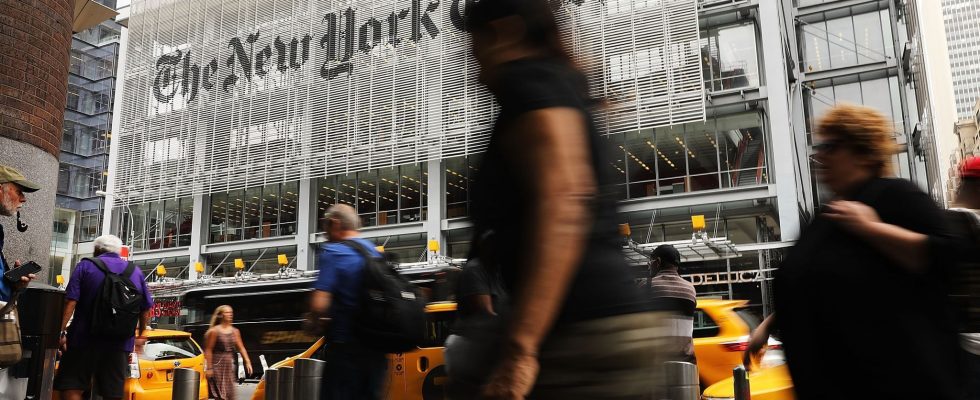Does ChatGPT question copyright? THE New York Times has just brought this thorny question into the legal arena. The American daily in fact launched proceedings, on Wednesday December 27, in a federal court in New York, against OpenAI, creator of the ChatGPT software, as well as Microsoft, its main shareholder, for violation of Copyright. Their complaint lists several examples of responses provided by ChatGPT repeating almost word for word articles published by its journalists, indicate our colleagues on the site Digital Factory. With such a process, the daily fears losing readers, particularly if their content is made free, while ChatGPT seeks to compete with the media as a reliable source of information.
“As the complaint explains, Microsoft and OpenAI used our work to develop and market their generative artificial intelligence (AI) products without having permission from the Times,” a spokesperson for the daily told AFP. that it is indeed a “violation of copyright in terms of content and journalistic work”. The newspaper puts the damage suffered, in fact and from a legal point of view, at “several billion dollars”. “Defendants’ generative AI relies on massive learning models that were built by copying and using millions of copyrighted Times articles,” the outlet added.
“The law requires them to ask permission”
In addition to financial damage – the exact amount is not known – the New York Times calls for the models powered by its content to be taken offline. It also calls on companies to destroy all chatbot models and training data that use copyrighted material from the US media outlet. “Copyright laws protect our journalism. If Microsoft and OpenAI want to use our work for commercial use, the law requires them to ask permission first. They have not done so,” insisted one spokesperson.
The American daily specified in its complaint that it had contacted Microsoft and OpenAI in April 2023 to express its concerns about the use of its intellectual property. He added that he had explored an “amicable solution”, possibly involving a commercial agreement and “technology guarantees” for AI products. But it never saw the light of day. An OpenAI spokeswoman, Lindsey Held, said in a statement that the company had “moved forward constructively” in its conversations with the new York Times and that she was “surprised and disappointed” by the trial. For its part, Microsoft refused to comment on the matter.
A legal void
Note that negotiations have been successful with other media groups. In mid-December, Sam Altman’s company reached an agreement with the German group Axel Springer, publisher in particular of the tabloid Bild, to pay it in order to provide content from the group in responses to requests from ChatGPT users. Under the terms of this partnership, presented as unprecedented by the two players, users asking a question to ChatGPT will receive in response summaries of articles published by Axel Springer’s brands, notably Politico, Business Insider, and the daily newspapers Bild and Welt. . Last July, it was the Associated Press, the major American news agency, which signed an agreement with OpenAI allowing it to exploit all the news reports published since 1985.
Since the launch of ChatGPT a year ago, the giants of Silicon Valley have been engaged in a frantic race for so-called generative AI. This makes it possible to obtain texts, images or lines of code of a level equivalent to those produced by humans, upon simple query in everyday language. Models trained mainly thanks to the mass of content present online. Note that generative AI tools can be used to produce derived content, which imitates the style of writers. Powered by several hundred billion words, ChatGPT raises many questions: how is it programmed to respect copyright? Who is the author of the texts offered by ChatGPT…?
Something to worry the artists concerned. In recent months, legal proceedings have continued, mainly from authors who accuse them of having pirated their content. In September 2023, it was George RR Martin, creator of Games of Thrones who, along with other writers, accused OpenAI of violating copyright. No complaint has yet resulted in a trial, but with the New York Times a new legal front could open.
